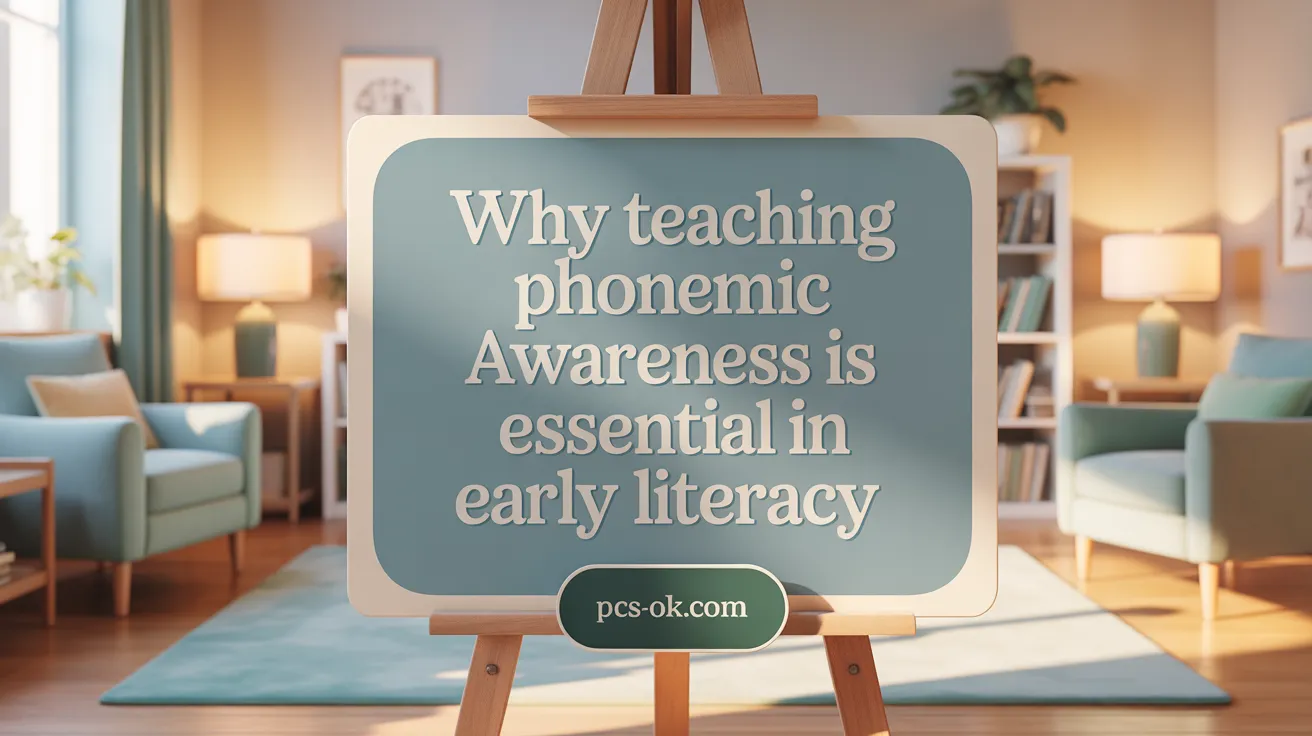The Importance of Phonemic Awareness in Reading
What Is Phonemic Awareness and Why It Matters for Reading Development

What is phonemic awareness and why is it important for reading development?
Phonemic awareness is the ability to hear, identify, and manipulate the smallest units of sound, called phonemes, in spoken words. Unlike recognizing words by sight, this skill focuses purely on auditory perception without involving printed letters. It encompasses activities such as isolating, blending, segmenting, deleting, and substituting sounds within words.
Understanding phonemic awareness is essential because it underpins the alphabetic principle—the idea that letters and letter combinations correspond to specific speech sounds. This connection is fundamental for decoding words during reading and encoding during spelling.
Having strong phonemic awareness skills significantly influences a child’s ability to learn to read. It predicts future reading success since it helps children analyze words into their individual sounds, making it easier to decode unfamiliar words and read fluently.
These skills also support reading comprehension by enabling children to recognize and manipulate sounds, thus improving their understanding of word structures. Moreover, phonemic awareness forms the foundation for phonics instruction, which teaches the connection between sounds and their written symbols.
Research shows that children who develop phonemic awareness early are more likely to become confident readers and writers. It helps bridge oral language and written language, ensuring children can sound out words, spell correctly, and understand vocabulary effectively.
In summary, phonemic awareness is a critical skill that cultivates the ability to analyze and manipulate speech sounds, directly impacting early literacy development, decoding efficiency, and reading fluency.
Phonemic Awareness as the Foundation of Literacy and Reading Skills
How does phonemic awareness contribute to literacy and overall reading skills?
Phonemic awareness is fundamental to learning to read because it allows children to recognize, analyze, and manipulate the individual sounds, or phonemes, in spoken words. It is a purely auditory skill that does not involve print but is crucial for understanding the alphabetic principle—the idea that letters and letter combinations represent speech sounds.
This skill supports decoding, which is the ability to translate written symbols into sounds, enabling children to read unfamiliar words efficiently. When children can blend separate phonemes into words or segment words into individual sounds, they gain a powerful tool for decoding and encoding, which directly boosts reading fluency and spelling.
Research consistently shows that difficulties with phonemic awareness, such as trouble blending or segmenting sounds, are strong predictors of future reading struggles, including dyslexia. Children who develop strong phonemic awareness early on are more likely to excel in reading tasks and continue to improve their literacy skills.
Effective instruction often involves explicit practice in phonemic awareness activities, like sound matching, segmenting, blending, and substituting sounds, coupled with letter knowledge. Combining these skills accelerates the mastery of reading and enhances vocabulary development, word recognition, and comprehension.
In summary, phonemic awareness provides children with the ability to understand that words are made up of discrete sounds, which is key to decoding words in print. This understanding underlies all successful reading experiences, from early word recognition to fluent reading, making phonemic awareness a vital component in literacy development across all age groups.
Educational Importance of Teaching Phonemic Awareness

Why is teaching phonemic awareness considered an essential educational practice?
Teaching phonemic awareness is a cornerstone of early literacy development. It involves helping children recognize, analyze, and manipulate individual sounds — known as phonemes — in spoken words. This phonological skill is vital because it directly influences a child’s ability to decode words, a crucial step in learning to read.
Research consistently shows that strong phonemic awareness predicts future reading success. Children who develop these skills early are more likely to excel at reading and spelling because they better understand that words are made up of smaller sound units.
Focusing on phonemic awareness also aids in preventing reading difficulties, including dyslexia. Children with weak phonological skills often struggle with decoding, which hampers their ability to read fluently. Explicit instruction helps children build the necessary auditory skills to connect speech sounds with written symbols.
This approach also strengthens the link between spoken language and print, essential for mastering alphabetic systems like English. Phonemic awareness serves as a bridge, enabling learners to transfer their listening skills into reading and writing tasks through phonics instruction.
Moreover, teaching activities such as blending sounds, segmenting words into individual sounds, and manipulating phonemes—adding, deleting, and substituting—have proven effective. Studies emphasize that early, targeted phonemic awareness programs, especially those conducted in small groups, significantly enhance reading outcomes.
In short, teaching phonemic awareness forms the foundation for successful reading development. It equips children with the tools they need to decode words effortlessly, supports early literacy, and fosters the skills necessary for long-term academic achievement.
Phonemic Awareness: The Cornerstone of Reading and Spelling Proficiency
How does phonemic awareness support the development of decoding and encoding skills?
Phonemic awareness is essential for understanding the relationship between sounds and written symbols. It involves recognizing, manipulating, and blending individual phonemes—the smallest units of sound in spoken words. These skills enable children to break down words into their core components, making it easier to decode unfamiliar words by mapping sounds to letters.
Children utilize phoneme manipulation skills such as segmenting words into phonemes, blending phonemes to form words, and substituting sounds, which are critical for accurate decoding. For example, blending the sounds /c/ /a/ /t/ to produce “cat” helps students recognize words in print. Similarly, segmenting a word like “ship” into its phonemes helps in spelling and word building.
What is the relationship between phonemic awareness and spelling development?
Strong phonemic awareness directly influences spelling abilities. When children grasp that words are composed of individual sounds, they can encode words by representing each phoneme with the corresponding letter or letter combination. This process is vital for spelling unfamiliar words and understanding spelling rules.
In early stages, children learning to spell rely on sound-to-letter mappings. As their phonemic awareness improves, they begin to spell with greater accuracy, understanding patterns and exceptions in spelling. Even in languages like Spanish, where orthography is more transparent, phonemic awareness continues to support spelling development by reinforcing the connection between sounds and their written representations.
How does developing phonemic awareness help prevent and remediate reading difficulties?
Research confirms that deficits in phonemic awareness are a major predictor of reading disabilities such as dyslexia. Children with weak phonological processing skills often struggle with decoding words, which hampers reading fluency and comprehension.
Early intervention focusing on phonemic awareness—through activities like sound blending, segmentation, and phoneme manipulation—can prevent reading difficulties before they become ingrained. For children already experiencing reading challenges, targeted phonemic awareness training can significantly improve their decoding skills, making it easier for them to recognize words and spell correctly.
Why is phonemic awareness foundational for phonics instruction?
Phonemic awareness serves as a prerequisite for effective phonics instruction, which involves teaching letter-sound correspondences and how to manipulate these in written language. With a solid phonemic awareness base, learners can better understand how letters and letter combinations represent speech sounds.
Combining phonemic awareness activities with phonics instruction accelerates reading development. It allows children to connect oral sounds with written symbols, facilitating rapid and accurate decoding. This synergy is especially important for developing fluent reading and spelling proficiency.
| Aspect | Explanation | Additional Details |
|---|---|---|
| Phoneme manipulation skills | Activities like blending, segmentation, substitution | Crucial for decoding and encoding |
| Support for decoding and encoding | Recognizing and manipulating sounds to read and spell | Foundational for mapping sounds to symbols |
| Relationship with spelling | Enhances understanding of sound-letter relationships | Aids in spelling regular and irregular words |
| Prevention and remediation | Early phonemic awareness training prevents reading struggles or improves existing skills | Critical for early literacy success |
| Foundation for phonics | Enables understanding of letter-sound relationships | Facilitates fluency and word recognition |
In summary, phonemic awareness is vital for developing proficient reading and spelling skills. Its emphasis on auditory and oral manipulation of sounds not only aids in deciphering new words but also promotes accurate spelling. Regular practice through engaging activities ensures that children build a solid foundation, setting the stage for lifelong literacy success.
Developmental Stages and Effective Instructional Strategies for Phonemic Awareness

What are the developmental stages of phonemic awareness and which instructional strategies are most effective?
Children’s development of phonemic awareness follows a clear progression from understanding larger sound units to mastering individual phonemes. Initially, young learners recognize rhymes, syllables, and onset-rime units—these larger sound segments help establish an awareness of sound structure within words.
As their skills mature, children move toward identifying and manipulating individual sounds, known as phonemes. This stage involves activities like blending sounds to form words, segmenting words into separate phonemes, and later, substituting, deleting, or adding sounds within words. These skills typically develop from preschool through early first grade.
Effective instruction at these stages is explicit and systematic. Teachers should incorporate engaging, multisensory activities such as matching sounds with visuals, using manipulatives like letter blocks or chips, and employing story-based and word play games. Beginning with activities that focus on larger units—rhyme recognition and syllable segmentation—helps build confidence and foundational skills.
Gradually, instruction shifts toward more precise tasks like blending sounds, onset-rime, and eventually, phoneme segmentation and manipulation. Consistent feedback, repeated practice, and scaffolded challenges ensure steady progress.
Monitoring children’s development through ongoing assessments is vital. Using validated tools helps educators identify children needing extra support. Small group instruction, tailored to specific skill levels, enhances learning outcomes.
Activities like rhyming games, sound matching, and phoneme deletion not only make learning engaging but also promote active mastery of each transition in the phonemic awareness development.
In summary, a structured approach that begins with broad sound recognition, gradually focusing on the smallest units with multisensory activities and regular assessment, is most effective for developing strong phonemic awareness skills.
Research Insights and Scholarly Perspectives on Phonemic Awareness in Reading Education

What insights do current research studies and scholarly work provide about phonemic awareness in reading education?
Recent research underscores the importance of phonemic awareness as a crucial predictor of early reading success. Scholarly investigations reveal that explicit and systematic instruction in phonemic skills—such as blending sounds to form words and segmenting words into individual phonemes—significantly improves reading outcomes for children.
Meta-analyses, like those by Erbeli and Rice (2024), suggest an optimal instructional dosage for phonemic awareness training around 10.2 hours of oral-only activities. The effectiveness of these activities increases when combined with print-based exercises, including letter-sound recognition and phonics, especially beyond 16 hours of instruction.
Studies also emphasize the benefits of integrating phonemic awareness with print activities. Activities that involve connecting spoken sounds to written letters enhance decoding skills significantly more than phonemic training alone. For young learners, early development of phonemic skills, coupled with letter knowledge, has been shown to causally influence later literacy achievement.
Expert consensus and research findings advocate for early, explicit, and combined instruction that simultaneously targets phonemic awareness and print recognition. This comprehensive approach helps children understand the relationship between sounds and symbols, forming a solid foundation for reading proficiency.
Moreover, research indicates that the benefits of phonemic awareness instruction are most pronounced when implemented within broader literacy curricula, supporting the idea that phonemic skills should be taught alongside phonics and vocabulary activities. Overall, scholarly work affirms that embedding phonemic awareness training across early literacy instruction is essential for promoting strong reading development, preventing difficulties, and supporting struggling readers.
| Aspect | Findings | Recommendations |
|---|---|---|
| Instructional Dosage | 10.2 hours optimal for oral-only phonemic training, more benefits with print integration after 16 hours | Plan early, targeted sessions, gradually adding print-based activities |
| Combining Skills | Blending, segmenting combined with print enhances decoding | Integrate oral phonemic activities with letter-sound exercises |
| Early Development | Phoneme awareness and letter knowledge causally impact future reading | Invest in early, explicit instruction in preschool and first grade |
| Intervention Strategies | Effective for struggling readers and in preventing difficulties | Use small groups, activities like sound games, visual aids |
Understanding the current research landscape highlights that phonemic awareness is a vital element in literacy education. When taught systematically, particularly in combination with print skills, it can significantly accelerate children’s reading success and help prevent future difficulties.
Phonemic Awareness and Its Impact on Language Acquisition Including Spanish Literacy
How does phonemic awareness impact language acquisition processes, including in languages like Spanish?
Phonemic awareness plays a crucial role in how children learn to read and write in any language. It involves recognizing, manipulating, and working with individual sounds—phonemes—in spoken words. This auditory skill enables learners to decode unfamiliar words and build a strong foundation for reading fluency.
In the context of Spanish, a highly transparent orthography, phonemic awareness helps children understand the consistent relationship between sounds and letters. Because Spanish words typically follow predictable phoneme-grapheme rules, early development of phonemic skills facilitates quicker mastery of reading and spelling. This transparency means that even children with limited explicit phonemic instruction can often develop reading abilities relatively fast.
Research from Mexico and the United States shows that despite less direct phonemic awareness instruction in Spanish, children still reach high literacy levels over time. They rapidly improve in reading, possibly because the regular sound-letter correspondences support the transfer of phonological skills to reading tasks.
Furthermore, in bilingual settings, phonemic awareness supports cross-linguistic transfer. Skills acquired in Spanish can bolster English literacy development, especially since English phonemes are more numerous and complex, but the foundational phonological skills remain similar. Children who develop strong phonemic awareness in Spanish often find it easier to learn English, as their ability to recognize sounds helps decode English words.
This transferability underscores the importance of early bilingual exposure, where systematic phonemic instruction in both languages can lead to better literacy outcomes. Additionally, understanding the phonemic structure of Spanish assists educators and clinicians in tailoring assessments, focusing on the specific sounds learners find challenging.
In summary, phonemic awareness not only underpins successful literacy development in Spanish but also enhances bilingual language acquisition. Its development fosters better decoding skills, supports cross-linguistic transfer, and ultimately contributes to more robust literacy in both languages.
The Relationship Between Phonemic Awareness and Broader Phonological Awareness in Reading Education
What is the relationship between phonemic awareness and phonological awareness in reading education?
Phonological awareness is a broad set of skills that involves recognizing and manipulating larger units of sounds in spoken language. These units include rhymes, syllables, and onsets and rimes, which are all critical for understanding the sound structure of words. This skill develops gradually during early childhood and creates a foundation for beginning readers.
Within this wider framework, phonemic awareness is a more specific subset that concentrates solely on phonemes—the smallest units of sound in speech. Tasks associated with phonemic awareness include activities like blending individual sounds to form words, segmenting words into their constituent phonemes, and manipulating these sounds by adding, deleting, or substituting them.
Both skills are vital for reading development. Phonological awareness helps children grasp the overall sound structure of words, which is necessary for decoding. Phonemic awareness specifically enables precise manipulation of sounds, aiding in spelling and decoding words more accurately.
Furthermore, the development of phonemic awareness is intricately linked to phonics instruction. Phonics involves teaching how letters and letter combinations represent specific sounds, making phonemic awareness essential for effective decoding and encoding.
Research indicates that explicit training in phonemic awareness significantly enhances reading achievement, especially for children who struggle with early reading skills. As children progress, these skills continue to influence each other—initial phonological awareness predicts early reading success, while ongoing reading experiences further strengthen phonemic awareness.
In sum, phonological awareness and phonemic awareness are interconnected. Together, they form a comprehensive framework that supports children’s ability to decode and understand words, which is fundamental for proficient reading.
Challenges in Phonemic Awareness Development and Their Educational Implications
What are common difficulties children face in developing phonemic awareness?
Many children face challenges in mastering phonemic awareness skills such as blending and segmentation of sounds. These difficulties may stem from developmental readiness, hearing issues, speech or language impairments, or neurodevelopmental disorders like autism. Children with weaker phonological memory or those from families with a history of reading difficulties often struggle more, especially as the demands of phoneme manipulation become more complex.
How do phonemic awareness deficits affect reading abilities?
When children lack strong phonemic awareness, their ability to decode words falters. This results in struggles with reading fluency, spelling, and overall literacy. These deficits are often early indicators of future reading challenges and can limit a child’s capacity to connect print and speech, making learning to read a more arduous process.
Which populations are particularly at risk?
Children with dyslexia, language impairments, or developmental delays are especially vulnerable to phonemic awareness deficits. For example, research shows that more than 80% of poor readers demonstrate weaknesses in phonological and phonemic skills. Children with these challenges may also have difficulties with rapid naming or verbal short-term memory, further complicating their literacy development.
Why is early assessment and intervention important?
Identifying phonemic awareness difficulties early is critical. Early assessment helps educators implement targeted interventions that focus on phoneme manipulation skills such as blending, segmenting, and substituting sounds. Instruction tailored to these needs can prevent difficulties from becoming entrenched, boosting long-term reading success.
What strategies support children with phonemic awareness challenges?
Effective strategies include short, focused lessons using visual aids, interactive activities, and engaging games. For example, activities like ‘I Spy’ with phoneme segments, sound jump games, or using puppets for sound talk make learning interactive and fun. Additionally, teaching in small groups enhances individual attention and allows for differentiated instruction tailored to children’s specific needs. These approaches are supported by research emphasizing their effectiveness in improving phonemic skills and overall reading abilities.
Phonemic Awareness: The Keystone of Successful Reading Instruction
Phonemic awareness stands as a fundamental pillar in the architecture of reading education. Its development empowers children to perceive and manipulate sounds, bridging spoken and written language in ways essential for decoding, spelling, and fluent reading. Evidence from research and classroom practice confirms that explicit instruction in phonemic awareness, especially when combined with phonics and letter knowledge, leads to improved literacy outcomes and helps prevent or remediate reading difficulties. The skill’s significance crosses linguistic boundaries, facilitating biliteracy and supporting diverse learners. As educators and stakeholders prioritize phonemic awareness in early literacy programs, they lay a crucial foundation that enables learners to unlock the written word and realize their full reading potential.
References
- Phonemic Awareness: What Is It and Why Is It Important?
- Role of Phonemic Awareness in Reading
- Why Phonological Awareness Is Important for Reading and …
- Phonemic Awareness vs Phonics
- Phonemic Awareness | Importance & Teaching Strategies
- The Importance of Phonemic Awareness in Learning to Read
- Phonological Awareness as the Foundation of Reading …
- Phonological and Phonemic Awareness: Introduction
- Skills for Early Reading: Phonological Awareness
- How Important Is Teaching Phonemic Awareness to Children …
